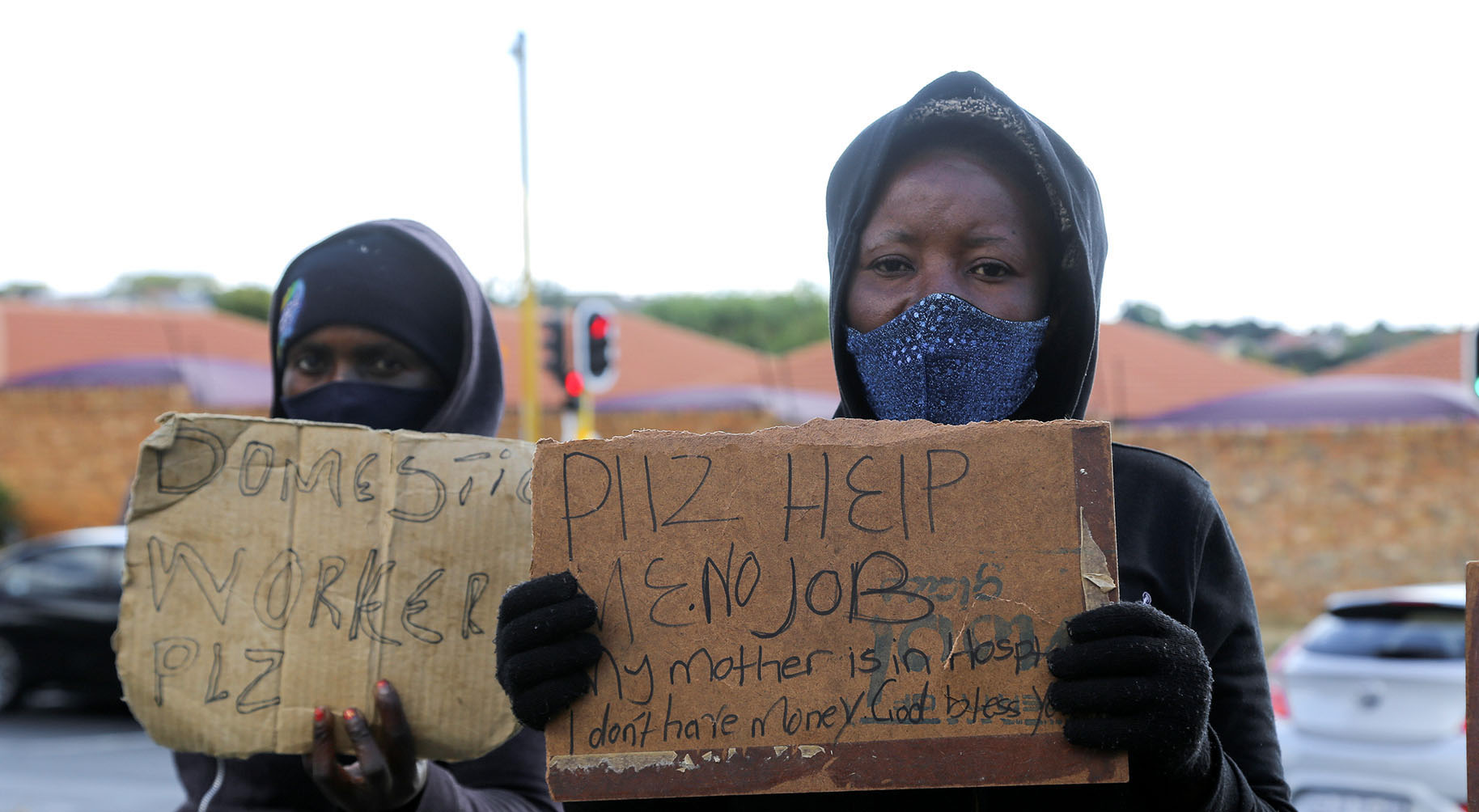DEFEND DEMOCRACY OP-ED
People’s power, not party power, will fix South Africa

On 2 and 3 July the Defend our Democracy campaign will hold a national conference to debate plans for rebuilding a South Africa that is in accord with constitutional values and free of corruption. It is inviting public comments on a discussion paper prepared for debate at the conference.
The conference will focus on crafting a united vision that our nation can mobilise around. Our contribution is to suggest how this can be achieved.
The discussion paper is available here.
The July conference
The immediate problems we are dealing with are evident to most South Africans: State Capture and institutionalised corruption. Those implicated run a shadow state that is attacking the judiciary and the Constitution and using insurrection, killings, fake ideologies and sabotage to render the country ungovernable.
Most members of the ANC and citizens desperately want justice to prevail, along with urgent changes to our political, economic and government systems. It is clear that our failure to decolonise and meaningfully implement the Constitution demands this.
There is, as yet, no definitive, unifying national vision.
ANC’s policy document wish list may yet alter South Africa’s future for the better
The importance of the July conference is that it addresses the nation and not the governing party, and seeks to find consensus on a way forward.
The future of our sovereign state is at risk. Failed states will not survive climate change, wars, famines, pandemics and mass forced migrations. We could use the potential of the Fourth Industrial Revolution (4IR) to implement solutions, but instead we have concurrent and growing crises of inequality, injustice, hunger, and unemployment.
Identification and analysis of the problem
The underlying assumption in the draft paper is that people’s power is derived from a democratic constitution and institutions.

We could use the potential of the Fourth Industrial Revolution to implement solutions, but instead we have concurrent and growing crises of inequality, injustice, hunger and unemployment. (Photo: Daniel Steyn)
We do not believe this conception is correct and will not lead to a viable consensus or strategy. People’s power will always come from organised people’s organisations, thinking, decisions, leadership and unified action.
Despite democratic aspirations being formally achieved, people’s power was replaced by bureaucracy with little democratic substance. Instead of building on the United Democratic Front (UDF) and other community-based democratic organisations, these were absorbed into the state, starved of funds, dismantled or relegated to a minor role.
How this happened was a complex mix of intended and unintended consequences, driven by an alignment of forces typical of post-colonial states.
The ANC inherited numerous strong rule-based institutions, but instead of building on them, most have been systematically undermined by mismanagement and corruption, and smothered with expensive bureaucratic structures. The District Development Model is typical, with its focus on intrastate cooperation rather than on working with communities.
After a “honeymoon” phase, the undermining of democracy and state organs led to a trust deficit on both sides and a breakdown in the compact between citizens, communities, capital and the state.
Theories and evidence informing the above analysis of the problem
In The Developmental State, Ha-Joon Chang et al identify the essential conditions to apply to all successful states, not just those labelled as developmental. They are:
- A single centre of state power, focused on development;
- A clear national vision and socioeconomic strategy, supported by a broad consensus;
- A viable national plan to implement the strategy, broadly supported and defended;
- A professional, competent public service that is focused on development and not self-enrichment and politics; and which can execute a national plan;
- Corruption visibly under control; and
- The mass of the population experiencing improvements in their lives.
South Africa’s poor performance in all the above indicators is no accident. An efficient, coordinated state is the enemy of corruption and patronage.
Despite this, there are many caring, competent state and elected officials who battle daily against the odds. The cost is most visible in the terrible suffering of the most vulnerable at local level.

Job seekers in Johannesburg on 4 June 2021. To create jobs, hundreds of thousands of small businesses must be created and survive. (Photo: Gallo Images / Luba Lesolle)
In South Africa, the six conditions outlined above can and must be achieved by implementing our Constitution through inclusive development that mobilises the energy and creativity of the people.
Jeremy Rifkin and later theories of the 4IR and society
Among others, Angela Merkel and China have applied Rifkin’s theories with significant success. The 4IR is a crucial factor that hardly features in the largely outdated National Development Plan (NDP), and is not mentioned at all in the discussion paper.
Critical changes that are relevant are knowledge-driven economies, with production that is highly dispersed (including energy production through renewable energy sources such as solar) and which is dependent on software platforms and the internet.
The new worker typically owns a small business, works on contract and does side-jobs, such as an Uber driver or a software developer. They demand a highly efficient and enabling state with conducive conditions to work and do business locally and globally, and that regulates contracts with, and the operations of, software platforms.
In the medium term, unemployment that results from automation can be mitigated by retraining and the rollout of infrastructure needed to enable all communities to access the internet and smart trade corridors.
The key question
Essentially, what is asked in the paper is: how can we best defend and reform the structures and institutions of the political, economic and state systems?
But what should be asked is: How can people’s power be established so that citizens and communities can defend their state and Constitution, and actively support critical reforms? This will entail broad-based action that is focused, united and strategic. If effectively implemented, it will lead to broader societal changes such as building a culture of accountability.
Given the proposed changes, what are the implications for a way forward?
The paper makes four proposals in different places. In summary, these are:
- Develop an active citizenry that will defend democracy and support reforms and programmes. No national vision or a unifying strategy is indicated, or how to translate the self-interest of different groups into a solid programme of collective national action;
- The paper suggests that the state and a renewed ANC should lead the reform of politics, economics and the state itself. This assumes that the ANC will be renewed and regain its leadership role, and that the state will regain trust by having a very different relationship with citizens and communities. This can only happen with broad-based mass support, not from officials and ANC members acting alone. No democrat should stand by while reformers in the ANC and the state are attacked or killed;
- The state and non-state actors must build complex alliances, which will encompass all sections of society. This partly addresses the concern that change led by the ANC will exclude much of the nation’s human potential;
- Young people must play a critical role, presumably for demographic reasons, and they have the most to gain and the energy and creativity needed.
If the building of people’s power in united action is central, then the first proposal is essential. There must be a viable strategy linked to inclusive development, and a sense of nationhood.
During the struggle against apartheid, people’s power was located in a broad front led by the ANC and was rooted in communities. The racist state was hostile but failed to destroy people’s power. Capture of the democratic state began with the capture of the ANC by those who want to plunder state resources. The state bureaucracy is now used to avoid accountability and deny agency to communities that try to oppose them.

Among others, Angela Merkel and China have applied Jeremy Rifkin’s theories with significant success. (Photo: Reuters / Fabrizio Bensch)
We suggest that the vehicle for building people’s power needed in South Africa is a broad front that is independent of the state and political parties. It should focus on development and security (broadly defined). The deeply rooted spirit of the UDF can be revived in a constitutional state that must be fully decolonised and be economically successful in a highly connected, 4IR global economy.
The front should be open to all adult citizens and non-government organisations that subscribe to its goals and principles. These should be grounded in the Constitution, which is fundamentally developmental, while holding the State accountable for delivering against its statutory mandates.
Development is always local
Every geographically defined community could have a development committee that would affiliate with the front and register projects. Organisations involved in development work at all levels would do the same.
Imagine if the energy and creativity of thousands of South African networks and organisations are connected and focused around a common national vision and goal. For example, there would be less fake news about Covid vaccines and probably in excess of 70% of the population would have two or three vaccinations.
To create jobs, hundreds of thousands of small businesses must be created and survive. The front would pressure and assist the government to enable development, such as affordable solar systems, broadband connectivity, security and transport corridors.
In conclusion, what is proposed is that democracy in South Africa must be developmental with state and non-state actors cooperating around a national vision and strategy. The strategy and plan must be jointly implemented by a professional state and a non-party coalition, rooted in communities, that can hold the state accountable while working closely with it and other partners. DM/MC
Tladi Ditshego is a specialist in the Practice of Infrastructure Development with graduate degrees from Georgetown University in Washington DC, Columbia University in the City of New York, and Wits Business School’s Executive Development Programme. His work experience is in both the public and private sectors. He writes in his personal capacity and is currently an independent consultant.
John Carneson is an independent consultant with a PhD from Sunderland, UK, a Master’s in Curriculum Studies from London and an Honours in Sociology from the London School of Economics. He was a senior manager in government for 22 years, most recently heading Policy and Strategic Management at the Department of Home Affairs. He writes in his personal capacity.
[hearken id=”daily-maverick/9472″]


















 Become an Insider
Become an Insider
Comments - Please login in order to comment.